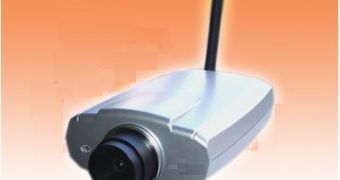A study made by the market-research firm iSuppli Corporation showed what the evolution of surveillance technology will be over the next couple of years. The eye-in-the-sky that looks over what you do during shopping at the local supermarket or when you park your car in an overcrowded parking lot is the method of control chosen by the majority of companies when it comes to security.
They're foolproof and, if you search the Internet a little bit, even bulletproof. See everything, "remember" everything. The system being used in the present is called Closed-Circuit Television (CCTV), and implies having a number of video cameras connected into a circuit normally based on a/more coaxial cable/s which connect the cameras with a centralized control center where all of the footage is shown on monitors and recorded for later use.
The evolution of the Internet has spawn some nifty new uses for all those cables running around the planet, and one of them was to introduce IP cameras. These are normal video surveillance cameras with a network interface and, most of the times, with a server included which allows the broadcast of the signal over the Internet. Get a computer with Internet access and, from anywhere in the world, you can keep a close eye on things.
This domain is believed to replace normal CCTV systems by 2011, although there are arguments for and against this. First, innovations like motion detection, behavior detection and thermal/infrared imaging will be integrated into these cameras. But then we have the limited public knowledge and expertise of this domain, the "conservative nature" of security personnel, and other conflicts due to the complexity the purchase of such a system implies.
"With the emergence of networked Internet Protocol (IP) video surveillance cameras and IP video servers-along with the rising use of Digital Video Recorders (DVRs)-video surveillance is moving beyond traditional security and into new applications such as transportation, retail, government and even home networking," said Mark Kirstein, vice president of multimedia content and services at iSuppli.
"This expansion is being helped considerably by the idea of networked video surveillance, which allows for greater flexibility, field upgradeability, increased automation and more intelligence to be incorporated into the overall system. Because of this, IP cameras will experience continued growth in surveillance, displacing existing Closed Circuit Television (CCTV) cameras with modern technology that can be networked into larger security systems. Similarly, surveillance DVRs are transitioning into networked devices," Kirstein added.

 14 DAY TRIAL //
14 DAY TRIAL //